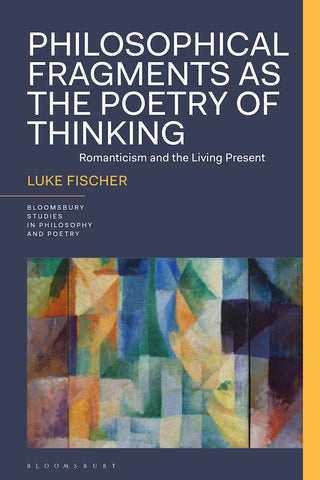Philosophical Fragments as the Poetry of Thinking : Romanticism and the Living Present
- Unit price
- / per
-
Author:FISCHER Luke
-
ISBN:9781350270084
-
Publication Date:December 2024
-
Edition:1
-
Pages:152
-
Binding:Hardback
-
Publisher:Bloomsbury Academic Publishing
-
Country of Publication:United Kingdom


A Back Order button means that we don’t have the book in stock at our store. It may already be on order – or we can order it for you from a publisher or distributor at no additional cost.
As we source items from around the globe, a back-order can take anywhere from 5 days to several weeks to arrive, depending on the title.
To check how long this might take, you’re welcome to contact us and we can provide an ETA or any other information you need. We recommend checking the timeframe before committing to an online order.
Philosophical Fragments as the Poetry of Thinking : Romanticism and the Living Present
- Unit price
- / per
-
Author:FISCHER Luke
-
ISBN:9781350270084
-
Publication Date:December 2024
-
Edition:1
-
Pages:152
-
Binding:Hardback
-
Publisher:Bloomsbury Academic Publishing
-
Country of Publication:United Kingdom
Description
Innovatively combining philosophical inquiry and aphoristic writing, this study presents a bold new interpretation of philosophical poetics. Exploring fragments, both thematically and formally, Luke Fischer situates the form as uniquely positioned between philosophy and poetry.
Like poetry, fragments condense insights into few words, employ striking metaphors that draw intuitive connections, and make space for creative interpretation. Contrasting with the logical linearity of much philosophy, fragments disclose rather than prove, intimate more than argue, suggest a whole without elaborating a system, and emphasize the intuitive act of thinking. Fischer readjusts our understanding of philosophical ideas as they originate in moments of illumination, and reveals the fragment as philosophy in process. In a collection of original fragments and an exploratory essay, Fischer sheds light on the relation between poetry and philosophy, aesthetics and society, art and the environment, and discusses seminal practitioners of the fragmentary form, including Novalis, F. Schlegel, Nietzsche and Heraclitus. Philosophical Fragments as the Poetry of Thinking makes an engaging, nonlinear case for the possibility and significance of a poetic transmutation of philosophy.
Adding product to your cart
You may also like
A Back Order button means that we don’t have the book in stock at our store. It may already be on order – or we can order it for you from a publisher or distributor at no additional cost.
As we source items from around the globe, a back-order can take anywhere from 5 days to several weeks to arrive, depending on the title.
To check how long this might take, you’re welcome to contact us and we can provide an ETA or any other information you need. We recommend checking the timeframe before committing to an online order.
You may also like
You may also like
-
Innovatively combining philosophical inquiry and aphoristic writing, this study presents a bold new interpretation of philosophical poetics. Exploring fragments, both thematically and formally, Luke Fischer situates the form as uniquely positioned between philosophy and poetry.
Like poetry, fragments condense insights into few words, employ striking metaphors that draw intuitive connections, and make space for creative interpretation. Contrasting with the logical linearity of much philosophy, fragments disclose rather than prove, intimate more than argue, suggest a whole without elaborating a system, and emphasize the intuitive act of thinking. Fischer readjusts our understanding of philosophical ideas as they originate in moments of illumination, and reveals the fragment as philosophy in process. In a collection of original fragments and an exploratory essay, Fischer sheds light on the relation between poetry and philosophy, aesthetics and society, art and the environment, and discusses seminal practitioners of the fragmentary form, including Novalis, F. Schlegel, Nietzsche and Heraclitus. Philosophical Fragments as the Poetry of Thinking makes an engaging, nonlinear case for the possibility and significance of a poetic transmutation of philosophy.
-
-
Author: FISCHER LukeISBN: 9781350270084Publication Date: December 2024Edition: 1Pages: 152Binding: HardbackPublisher: Bloomsbury Academic PublishingCountry of Publication: United Kingdom
Innovatively combining philosophical inquiry and aphoristic writing, this study presents a bold new interpretation of philosophical poetics. Exploring fragments, both thematically and formally, Luke Fischer situates the form as uniquely positioned between philosophy and poetry.
Like poetry, fragments condense insights into few words, employ striking metaphors that draw intuitive connections, and make space for creative interpretation. Contrasting with the logical linearity of much philosophy, fragments disclose rather than prove, intimate more than argue, suggest a whole without elaborating a system, and emphasize the intuitive act of thinking. Fischer readjusts our understanding of philosophical ideas as they originate in moments of illumination, and reveals the fragment as philosophy in process. In a collection of original fragments and an exploratory essay, Fischer sheds light on the relation between poetry and philosophy, aesthetics and society, art and the environment, and discusses seminal practitioners of the fragmentary form, including Novalis, F. Schlegel, Nietzsche and Heraclitus. Philosophical Fragments as the Poetry of Thinking makes an engaging, nonlinear case for the possibility and significance of a poetic transmutation of philosophy.
-
Author: FISCHER LukeISBN: 9781350270084Publication Date: December 2024Edition: 1Pages: 152Binding: HardbackPublisher: Bloomsbury Academic PublishingCountry of Publication: United Kingdom
-



